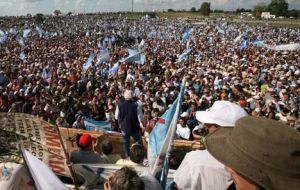MercoPress. South Atlantic News Agency
Argentine farmers agree on a 30 day truce and dialogue
 Farmers meeting decided to stop their strike for 30 days
Farmers meeting decided to stop their strike for 30 days Argentine farmers on Wednesday decided to suspend three-weeks of strikes and road blocks aimed at reducing additional export tariffs on oil seeds and grains, calling for a 30-day truce and talks with the government.
The four main unions, meeting in Gualeguaychu 250 kilometers north-east of Buenos Aires, made the decision "in agreement with participants in the street blockades" said Mario Llambias, president of the Argentine Rural Confederation (CRA). He was speaking to 35,000 farmers and their families gathered for the decision. The unions demanded a "serious dialogue" with the government, but said they would insist that the Legislature, and not the Executive, establish any new taxes on their exports. "We're going to talk with those who understand camp affairs and have the political power", said Llambías. Farmers also underlined that discussions will not be limited to the "soy beans issue", but must also include all grains, beef, milk and regional policies. The move follows an appeal by President Cristina Fernandez de Kirchner to end the strike, which has emptied food shelves and caused beef and fresh milk shortages. The farmers denounced Mrs. Kirchner's speech from the day before, when she threw striking farmers into the same philosophical pot as the generals who launched the putsch and military dictatorship of 1976 to 1983. "The people in the countryside are not using pistols, rather only their work tools," the farmers said in a statement. Farmers are angry over the increase in the export tax on soy and sunflower products from 35 to 44%, which the government says are necessary to keep more food in the country and affordable for Argentines. Prices for exports have been rising as international demand for the important commodities grows. During the strike, farmers blockaded trucks carrying farm products. The government approved some tax relief and freight compensations for small farmers on Monday, but on Tuesday, Mrs. Kirchner rallied tens of thousands of her Peronista supporters to Plaza de Mayo in the heart of Buenos Aires where she denounced the farmers for criticizing a democratically elected government. As Argentina's first female president, she also said she was being singled out for criticism as a woman. Tuesday's massive gathering attracted the traditional trade unionists, social movement advocates and local authorities who make up the populist Peronist movement, to which Mrs. Kirchner belongs. Analysts said the gathering was intended as a show of force of the Peronist forces against the conservative farmers. Many who attended were bussed into the city center by the Peronist-allied organizations. The farmers' strike was coordinated by the Confederation of Rural Associations of Buenos Aires and La Pampa (CARBAP), the Agrarian Federation of Argentina (FAA), the CRA and the Rural Society of Argentina (MRS). On Tuesday, Argentine customs officials placed some new restrictions on the export of beef.




Top Comments
Disclaimer & comment rulesCommenting for this story is now closed.
If you have a Facebook account, become a fan and comment on our Facebook Page!